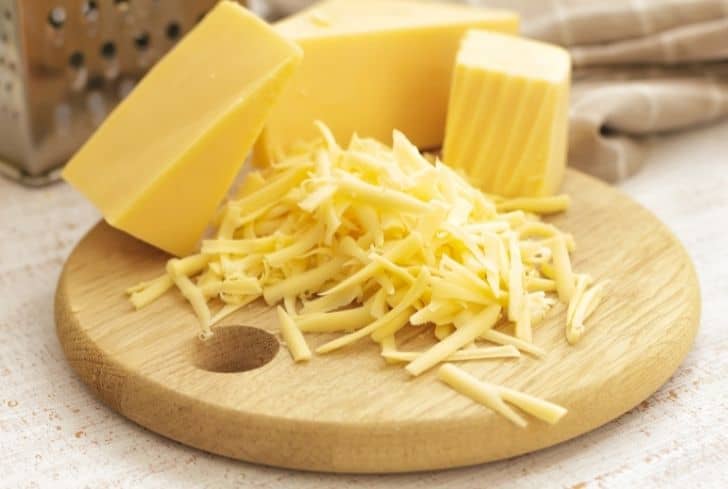The greatest challenge we are experiencing today as the people of the world is global warming and climate change. Methane is a gas that has about 80 times more warming power and is 25 times more potent at trapping heat than carbon dioxide and surprisingly, one of the largest producers of methane, is cows.
Cows apart from dooming our very existence on this planet, are also responsible for milk, yogurt, ice cream and cheese, among other products. Cheese is a valued product and an ever-present resident of most kitchens. This article looks into cheese and how it should be treated, like freezing and composting.
Is Cheese Compostable?
Well, yes, cheese is compostable, although be very careful when doing it. Dairy products like cheese are some of those foods that most traditional composters will advise you to avoid. The main reason for this is because animal food waste is considered to attract pests.
However, if you want to compost them, go right ahead as it is possible. Also, dairy products are not very substantial and have a low material structure and they tend to be soft and not have much roughage or texture.
Moreover, mixing dairy with dry fibrous materials is not recommended when you are about to compost, but to help solve the issue, consider adding dry leaves, straw, or even shredded paper.
It helps compensate for the wetness and lack of texture of dairy products, improving the structure and encouraging air pockets to help keep the compost aerated.
Although food waste is generally high in moisture, dairy products have very high moisture and high-fat content. The fat is the issue with composting dairy products. The high fat and oil content tends to slow down the composting process.
This is because fat can create a watertight coating over other materials. The microorganisms responsible for decomposition need air to function correctly so this waterproof barrier causes problems.
Cheese and other dairy products are also highly prone to odor production when composted. This is usually because clumps of food stick together and encourage anaerobic decomposition.
Anaerobic decomposition is undesirable in a compost pile. This process is much slower than aerobic decomposition. If your compost smells of ammonia, then you have anaerobic conditions.
To effectively compost cheese, first, use a big composting bin. Larger bins have the advantage that they build up more heat at the center of the composting mass. Hot composting can kill any pathogens resulting from waste like dairy products.
Also, a large bin will contain as much waste as possible, something that will be required to compost a lot of cheese.
Secondly, bury the cheese at the center of the compost pile as this will act as a filter to break down any leachate from the dairy products.
Burying the cheese under a thick layer of other compostable materials will also help filter the smells that will attract pests. Next, make sure you mix the cheese with plenty of brown materials. They act as a bulking agent and help to absorb anything that can leach out of your compost bin.
Also, be sure to break up the cheese into smaller pieces as smaller chunks will decompose quicker and maybe avoid anaerobic conditions. Turn the compost pile regularly to aerate it, avoid anaerobic bacteria from building up and accelerate the process.
Finally, use gloves as animal food scraps like dairy and meat products may contain dangerous pathogens
Is Cheese Wax Compostable?
No, cheese wax is not compostable, although it is biodegradable. Cheese wax is derived from a blend of paraffin, colorings and microcrystalline, so adding cheese wax to your compost is not advisable. Both paraffin and microcrystalline are petroleum-based and all petroleum-based products should not be composted.
The materials will take forever to break down completely, meaning if you compost cheese wax, be prepared to wait for a couple of hundred years before it completely breaks down.
Sending it to a landfill is also not an option as the cheese wax will be a nuisance to the environment rather than decomposing. Even such products will decompose, eventually.
The reason why sending cheese wax to the composting bin is not recommended is that you will wait for like 450 years or more before it decomposes. Guess where you will be by then…yeah, very much not alive.
Rather than sending cheese wax to the composting bin or landfill, the best thing to do with it is to reuse it. Unlike other waxes, cheese wax remains pliable and soft even after you set it. You can easily peel it away from the cheese without making it crack or crumble in brittle pieces.
First, you can use the wax to sea bottles and jars, but you should ensure it is clean.
Secondly, you can use it as a fire starter as the paraffin in the wax will help sustain the flame. Most campers and adventurers use it during their outdoor activities like camping.
Thirdly, use the wax for molding, turning it into different yet unique shapes for fun. You can also practice drawing a wide range of objects using wax. You can also reuse the wax or pass it on to your friends who like making hard cheese at their homes. Finally, you can make medieval wax for your kids
Can You Compost Cottage Cheese?
Well, you can compost cottage cheese, but be very careful when doing it. Like the traditional cheese discussed above, cottage cheese will invite pests as it biodegrades and these pests will be a nuisance unless you take extra caution.
Cottage cheese differs from cheese in the fact that it is a soft cheese curd product while the other cheese is hard and yellowish-white in color. Nonetheless, once composted, it will biodegrade but will produce odors that will invite pests.
Cottage cheese, like other dairy products, will produce odors when composted because the clumps of food will stick together and encourage an anaerobic decomposition. The process is undesirable in a compost pile, will smell like ammonia and will be much slower than aerobic decomposition.
The cottage cheese and other kitchen scraps are one-half of the ingredients needed to make a healthy compost pile. The other half is brown materials that introduce carbon to the composting process. They include dry leaves, sawdust, and wood chips, among many others.
Mix the cottage cheese with a lot of brown materials to help absorb anything that can leach out of the compost bin. Plenty of material also acts as a bulking agent, helping out with the composting process.
Also, be sure to compost your cheese and other materials far away from a source of water, like a river, stream or well. This is to avoid leachate contamination. Also, when composting cottage cheese, bury it under a thick layer of already decomposing compost and dry materials at about 18 inches, to help filter the smells.
Be sure to turn your compost to aerate it regularly. Finally, use gloves when handling animal food scraps in the compost as they carry parasites and bacteria which could live on outside the composting bin and probably on your hands and in your house
Can You Freeze Cheese?
Definitely, you can freeze cheese. Cheese is best enjoyed fresh to maximize its flavor and texture, but sometimes it is not feasible to use large amounts of it within the use-by date this is where freezing comes in, as a preservation method, reduce waste, save money and increase its shelf life.
Cheeses with a higher water content freeze at higher temperatures than those with lower water content. This means cottage cheese will freeze at about 29.8℉ (-1.2℃), while cheddar cheese will freeze at 8.8℉ (-12.9℃).
Although freezing does not destroy the nutrients in the product, it will affect its texture and quality. When cheese is frozen, small ice crystals form on the inside, disrupting the internal structure of the cheese and when it is thawed, water will be released, causing the product to dry out, become crumbly, and potentially develop a mealy texture.
Freezing inactivates microbes in the cheese, such as bacteria, yeasts, and mold, helping extend its shelf life and further preventing it from going bad.
Dairy Australia recommends freezing fresh cheeses like ricotta or soft cheeses like brie or blue cheese. As already mentioned, freezing affects the structure and overall quality of the cheese. However, if these cheeses are being used in dishes like lasagne or quiches and then the dish is frozen, this will be perfectly fine.
The opposite is also true for hard cheeses like parmesan, cheddar and mozzarella, which are great when frozen. However, it is recommended that you grate the cheese first, pop it in a Ziplock or freezer bag and then use them straight from frozen in your cooking.
In cases of ripened cheeses like blue cheese and Camembert, live mold and bacteria populations are deliberately added to give these varieties distinctive textures and flavors.
Since freezing damages these microbes, it can stop these cheeses from ripening properly when thawed, potentially decreasing their overall sensory quality. Therefore, be careful when freezing your cheese and understand it first.
Is Cheese Biodegradable?
Yes, cheese is biodegradable and that is why it should end up in compost if it is no longer needed in the house. Cheese is a dairy product, made from naturally occurring animals, like cows, goats, and sheep. Therefore, being an organic product, it is biodegradable and can safely be composted.
However, be careful when composting cheese as it will invite pests and potentially mess up your compost if additional care is not taken. When proper care is taken when composting cheese, all the underlying issues listed above will be eliminated and you will have peace of mind as your compost continues to cook.
All sorts of cheese are biodegradable, regardless of type or whether or not they were frozen. Their ability to compost is however not as seamless.
Cheese wax, for instance, is biodegradable, although it will take quite a long time. This is why cheese wax cannot and should not be composted, despite it being biodegradable.
Cheese wax is derived from a blend of paraffin and microcrystalline, both of which are petroleum-based. The current mess we find ourselves in in the world today, global warming and climate change, are largely attributed to petroleum-based products.
They are non-renewable resources, making them unsustainable and once combusted, they release harmful toxins and gases to the environment, further putting our lives in jeopardy. Cheese wax, being a product of the same is, therefore, more of the problem than a solution.
Despite it being biodegradable, it can take hundreds of years before fully breaking down, so should not be composted. All other types of cheese are largely compostable, given the fact that they are biodegradable.
Simply add the cheese to the composting bin, grate it if it was the hard type or was frozen, and then cover it with enough brown materials. It will be fully broken down in a couple of days.






